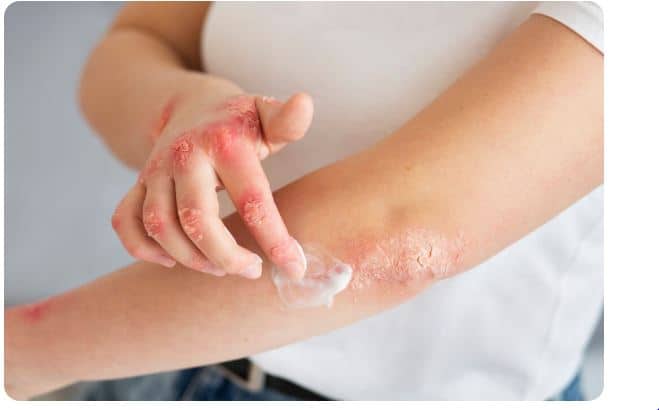
Daily habits, gentle routines, and mindful choices can significantly reduce eczema flare-ups. Understanding what your skin reacts to helps you build a long-term plan that supports comfort and resilience.
Table of Contents
Introduction
Eczema can feel like more than a skin condition. It affects comfort, confidence, and even sleep, especially when flare-ups become frequent. The encouraging news is that steady care and simple lifestyle adjustments can calm irritation and support the skin barrier. Understanding what triggers your symptoms and how to nurture your skin daily can make living with eczema far easier and more predictable.
What Happens to the Skin During Eczema?
Eczema, or atopic dermatitis, makes the skin barrier weaker than usual. This means the skin loses moisture more quickly and becomes more sensitive to irritants and allergens. As a result, it can become dry, itchy, and inflamed. Flare-ups may appear on the arms, neck, face, or behind the knees. When these symptoms become frequent or difficult to manage with home remedies, consulting an expert dermatologist near me can help identify the right approach based on skin type and daily routine.
How Can Daily Habits Influence Eczema Symptoms?
The way you care for your skin each day plays a big role in managing eczema. Harsh soaps, hot showers, and rough towels can strip away natural oils. The goal is to keep the skin barrier hydrated and protected. Using mild cleansers, applying moisturiser right after bathing, and wearing soft fabrics like cotton can make a real difference. Small, steady habits often lead to fewer flare-ups over time.
Which Everyday Triggers Should Be Avoided?
Eczema triggers vary for everyone, but several common irritants can make symptoms worse.
Examples include:
- Scented soaps or strong detergents
- Dust, pet dander, and pollen
- Long hot baths or showers
- Tight clothing that causes friction
- Sudden temperature changes or sweating
When it’s hard to identify the specific cause, an expert dermatologist in Bangalore can help narrow down what might be irritating your skin and design a manageable care plan.
How Important Is Moisturising in Eczema Care?
Moisturising is one of the most effective ways to protect eczema-prone skin. It locks in hydration, strengthens the barrier, and reduces itching. Creams and ointments tend to work better than lotions since they contain more moisture-retaining ingredients. Applying moisturiser at least twice daily – especially after washing – can prevent dryness before it begins. If the skin still feels irritated despite regular care, seeing an expert dermatologist near me for suitable medical creams can be helpful.
Can Diet and Hydration Make a Difference?
While eczema isn’t caused directly by food, certain items can influence inflammation. Spicy dishes, dairy, or processed foods may occasionally worsen flare-ups for some people. Staying hydrated supports skin repair and helps keep dryness in check. Balanced meals rich in omega-3 fatty acids, fruits, and vegetables can improve the skin’s resilience. Guidance from an expert dermatologist in Bangalore can help identify whether specific foods or allergies play a role in your flare-ups.
How Does Stress Affect Eczema?
Stress can trigger or worsen eczema by increasing inflammation and reducing sleep quality. Managing stress with relaxation techniques like meditation, breathing exercises, or gentle walks can help calm the mind and, in turn, the skin. Even small stress-management habits, when practiced consistently, often reduce the intensity of flare-ups.
When Should Someone Seek Professional Treatment?
Medical attention becomes important when eczema interferes with daily life, causes open wounds, or leads to frequent infections. A specialist can prescribe medicated creams, antihistamines, or newer treatments like light therapy, depending on the condition’s severity. Visiting an expert dermatologist near me ensures that your care plan is personalised and safe for long-term use.
What Are Some Supportive Lifestyle Tips for Eczema Management?
Simple lifestyle choices can complement medical treatment and maintain comfort.
Helpful habits include:
- Keeping nails short to avoid scratching injuries
- Using a humidifier during dry seasons
- Wearing breathable fabrics like cotton or bamboo
- Staying hydrated throughout the day
These small steps can keep the skin calm and comfortable. For recurring or resistant cases, an expert dermatologist in Bangalore can recommend advanced options tailored to your skin’s sensitivity.
Conclusion
Eczema management is not about eliminating every flare-up but learning how to keep them short, mild, and less frequent. With gentle skincare, mindful routines, and professional support, your skin can remain healthier and more resilient. Working with an expert dermatologist in Bangalore helps you feel guided, cared for, and confident in your daily life.
Follow – https://sggreek.com for More Updates


